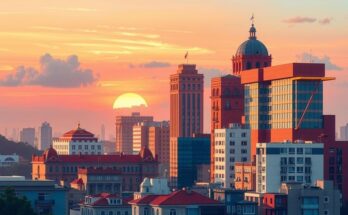The African Penguin in South Africa holds immense economic value, estimated between R2 billion and R4.5 billion, with significant job implications. Despite these contributions, populations have plummeted due to various human activities. Protective measures are necessary beyond island closures for both ecological preservation and economic stability. Recent recommendations for new closures may offer improved survival prospects for this endangered species.
The African Penguin populations in South Africa are facing critical endangerment, leading experts to stress their substantial economic worth, estimated between R2 billion and R4.5 billion in 2023. These colonies contribute to significant job opportunities, with a reported 1,046 to 4,611 jobs associated with them. The ongoing discussions around environmental protection have fostered a tension between preserving nature and economic interests, particularly from the pelagic fishing industry which holds up to 5,100 jobs and contributes R5.5 billion to the economy annually.
The declines in the penguin population—down from 300,000 in the 1950s to approximately 8,324 breeding pairs today—stem from various human activities. Invasive fishing practices, climate change, and environmental changes pose serious threats to their survival. Ocean health and management approaches in fisheries could help mitigate these impacts, necessitating an ecosystem-focused strategy for conservation.
Research from Anchor Environmental Consultants highlights that effective conservation strategies are critical for the long-term survival of African Penguins. The loss of these species could damage South Africa’s international reputation, which hinges on environmental stewardship. It is imperative to implement protective measures beyond merely closing islands to fishing, as ecological conservation must address the broader environmental context.
Specific tourism potential exists in areas like Bird Island, which remain underutilized. The Simon’s Town penguin colony has shown significant visitor growth, attesting to the potential economic benefit of penguin-related tourism. Furthermore, as tourism in South Africa grows, so does the importance of preserving penguins for the national economy.
The government’s attempts to close fishing areas around islands have not sufficiently halted the decline of penguin populations. Studies suggest that current no-take zones yield minimal benefits to the penguins and negligible impact on fisheries. Recent court interventions have prompted new considerations for closures based on island-specific analyses, which offer hope for improving penguin survival rates. The exact efficacy of these measures, however, remains to be assessed.
In summary, the African Penguin serves as a vital ecological and economic asset for South Africa. Its value, extending from tourism to ecological significance, underscores the necessity of effective conservation strategies that transcend mere fishing restrictions. With the recent establishment of new protective measures, there lies hope for the recovery of penguin populations and the preservation of South Africa’s environmental reputation, a crucial aspect for its tourism industry and ecological legacy.
Original Source: groundup.org.za




